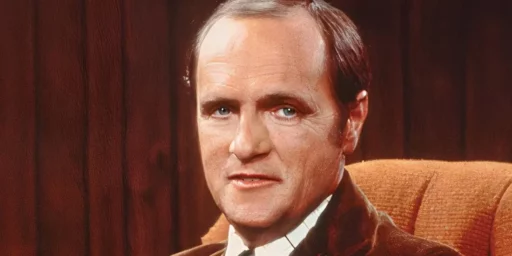Late Night Sexual Harrassment
 Nell Scovell, one of a handful of women who has ever worked as a comedy writer for David Letterman — or any of the late night comic talk shows — contends that an atmosphere of sexual harassment routinely exists on those shows:
Nell Scovell, one of a handful of women who has ever worked as a comedy writer for David Letterman — or any of the late night comic talk shows — contends that an atmosphere of sexual harassment routinely exists on those shows:
Without naming names or digging up decades-old dirt, let’s address the pertinent questions. Did Dave hit on me? No. Did he pay me enough extra attention that it was noted by another writer? Yes. Was I aware of rumors that Dave was having sexual relationships with female staffers? Yes. Was I aware that other high-level male employees were having sexual relationships with female staffers? Yes. Did these female staffers have access to information and wield power disproportionate to their job titles? Yes. Did that create a hostile work environment? Yes. Did I believe these female staffers were benefiting professionally from their personal relationships? Yes. Did that make me feel demeaned? Completely. Did I say anything at the time? Sadly, no.
Here’s what I did: I walked away from my dream job. The show picked up my option after 13 weeks; then, about two months later, while looking for a nicer apartment, I realized I didn’t want to commit to a yearlong lease. I’d seen enough to know that I was not going to thrive professionally in that workplace. And although there were various reasons for that, sexual politics did play a major part.
As Rachel Sklar points out, Scovell isn’t some unsuccessful woman blaming her woes on her sex: “She created the TV series Sabrina, the Teenage Witch and has written for Coach, Murphy Brown, Monk, N.C.I.S., Charmed, The Critic, The Simpsons and Newhart. And Late Night with David Letterman.” Indeed, as Scovell notes in her piece, she was the story editor for Newhart when she was hired to write for Dave.
Melissa McEwan, Don Surber, and Ed Driscoll all bring different perspectives on this but still agree this was sexual harassment. So do I.
But here’s the thing: I don’t know what you do about it.
Letterman controls these people’s careers, so for him to have sexual relations with them is problematic and opens him and his company up for lawsuits. Sexuality creates incredible tension and problems in a workplace. Ideally, then, we would just treat each other as colleagues rather than as potential romantic partners. But people like this spend an inordinate amount of time at work and attraction does happen. Supervisors and subordinates not only become sexually intimate but fall and love and build lives together. It happens all the time.
In larger offices, this is reasonably easy to fix. People can move laterally to avoid senior-subordinate relationships. But in a small team like a 14-person comedy show staff?
Scovell’s solution is to hire more women. She reports that there are currently zero women working on any of the major shows (Letterman, Leno, and O’Brien — no mention of Colbert and Stewart). But, as a practical matter, having zero women markedly reduces the chance of sexual harassment! With more women on the staff — something that otherwise seems a no-brainer given the number of women in the audience — there’s more chance for relationships to form and resentments to foster.
So, there’s the law, human decency, and the way things ought to be. But there’s also human nature and the power of romantic and/or sexual attraction. These things often conflict.





The fascinating thing, of course, is that all of her complaints could be applied to any personal relationship. Whether it is golfing or basketball buddies (hello Mr. President), drinking buddies, or even, heck, just friendship. Does being close to a high ranking person in a office bring benefits… of course. But as far as that goes, I am not sure sexual relationships are fundamentally different.
This issue is whether women are feeling coerced into having relationships for their careers, and in many cases that isn’t the issue. It is just consensual relations and people are jealous of the bond it creates. But people also get jealous of not being invited out for drinks or a round of golf.
If sexual tensions in the workplace are deemed bad business, then a company can certainly lay down rules to prevent it. That it ‘goes against human nature’ is no more a mitigating excuse against this than any other law or rule that seeks to channel human behavior.
A simple clause in a contract that states getting involved with a subordinate voids the contract would surely be enforceable, even if it made for a tough business decision. Or do we accept that, as with some businesses, there are ‘stars too big to fail’?
If employees can’t keep it zipped when it comes workplace partners, then they need to find new jobs, in different companies. Yeah, that’s a pain; it might even lead to reduced incomes. But a company has real interests in minimizing disruption in the workplace as well as in limiting legal liabilities for a hostile workplace.
That’s a valid point. Sexual relationships might be a difference in degree but not in kind.
No question that’s true. But it’s also swimming against the tide and likely to just lead to more surreptitious relationships.
A rule of that nature would be easier to enforce at, say, Wal-Mart. People working eight hours or so a day, five days a week, whose jobs end the second they punch out can easily establish rich lives and relations outside work. That’s less true for jobs where 14-hour days going well into the night are common.
There’s also the issue, as you say, of star power. It’s harder to fire a great comedy writer — let alone show host — than it is a stock clerk or cashier.
Makes me wonder what the female audience for Late Night comedies are?
This is why TV writers have it better than us poor book writers. The only woman in my “workplace” is my wife.
What annoys me is that this kind of story is always presented one way — powerful male takes advantage of subordinate female. In real life, my experiences have been a lot different. In real life, I have found that attractive people are objects (victims?) of unwanted sexual advances regardless of gender (m/f), orientation (hetero-/homo-) or position in the power structure. Our department chairman for example was a guy who had “it” and I remember numerous times when female subordinates made brazen sexual advances to him in the halls. His defense mechanism was to completely ignore it and proceed with the conversation as if they had said nothing sexual. In other words, I don’t accept the stereotype as the alpha and omega of the subject.